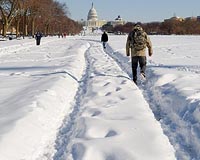 |
Cancun, Mexico (UPI) Dec 14, 2010 U.N. climate change negotiations buried a year ago in Denmark rose from the grave in Cancun, Mexico, at a summit that saw a last-minute breakthrough to instill the negotiations with careful fresh hope. The agreement struck in Cancun, where representatives from 194 nations met to prepare a new climate protection treaty, calls for major emissions cuts, launches a multibillion-dollar fund to help poor nations adapt to climate change and finalizes a scheme to stop deforestation. In a significant progress to the negotiations, all countries -- including the United States and China -- agreed that much stronger efforts are needed to contain the warming of the climate to no more than 3.6 degrees Fahrenheit, a threshold scientists say is crucial to avert the most catastrophic effects of the temperature increase. "This is a really important moment, a turning point in the long-running saga of international climate change negotiations," said Britain's Climate Secretary Chris Huhne. The so-called Cancun Agreement might even convince the European Union to boost its target of cutting carbon dioxide emissions by 2020 from 20 percent to 30 percent, he added. While Cancun ended on a positive note, observers noted that there's still a long way to go to reach an ambitious successor treaty to the Kyoto Protocol, which runs out in 2012. The Cancun Agreement will have to be adopted and ramped up at a future summit. As of now, global pledges to reduce carbon dioxide emissions fall short of what's needed to limit global warming to below 3.6 degrees F. Adding up industrialized nations' reduction targets while considering all the loopholes buried in the current agreement amounts to reductions of 2 percent in 2020 based on 1990 levels, the Boell Foundation, a policy think tank linked to the German Green Party, said in its analysis of the summit. "That's a catastrophe," it added. In the run-up to the Cancun summit, there was significant suspicion in the United States that the U.N. process can actually deliver a binding agreement that includes commitments for rich and developing nations alike. There are still doubts to that end but Cancun gave observers fresh hope because it showed that the U.N. negotiations can still yield results after negotiations failed so miserably at a summit in Copenhagen, Denmark, last December. The run-up to the Cancun meeting and its first days had yielded few reasons to believe that things would be different in Mexico. The United States was pitted against China in a debate over accountability; the left-leaning Latin American nations cried foul when industrialized wouldn't significantly up their reduction pledges; and finally, Japan, usually calm in international negotiations, threatened to block any decision that wouldn't bury for good Kyoto, a treaty of extreme importance to developing nations because it has held rich nations accountable to emissions cuts. Unlike last year's Danish presidency, the skillful Mexican chairmanship made every effort to have all voices heard. It managed reduce much of the disharmony by compromise-brokering or by simply sidestepping the most contentious issues with crafty wording. Ahead of the final session, an agreement all of a sudden seemed within reach. Only Bolivia, disgruntled by what it said was "ecocide" committed by rich nations, until the very last minute refused to back the compromise agreement. In the end, to thundering applause from the delegates, the Mexican chairman adopted the agreement while merely noting Bolivia's opposition -- a unique step in U.N. negotiations often undermined by the need for unanimous decisions.
Share This Article With Planet Earth
Related Links Climate Science News - Modeling, Mitigation Adaptation
 Despite Cancun deal, US shifts away on climate
Despite Cancun deal, US shifts away on climateCancun, Mexico (AFP) Dec 14, 2010 A new international accord on global warming has heartened environmentalists, but casting a shadow is the political shift in the United States where legislative climate efforts died in 2010. President Barack Obama's administration played an active role brokering the December 11 deal in Cancun, Mexico, which pledged deep cuts in carbon emissions blamed for climate change and set up a new glob ... read more |
|
| The content herein, unless otherwise known to be public domain, are Copyright 1995-2010 - SpaceDaily. AFP and UPI Wire Stories are copyright Agence France-Presse and United Press International. ESA Portal Reports are copyright European Space Agency. All NASA sourced material is public domain. Additional copyrights may apply in whole or part to other bona fide parties. Advertising does not imply endorsement,agreement or approval of any opinions, statements or information provided by SpaceDaily on any Web page published or hosted by SpaceDaily. Privacy Statement |